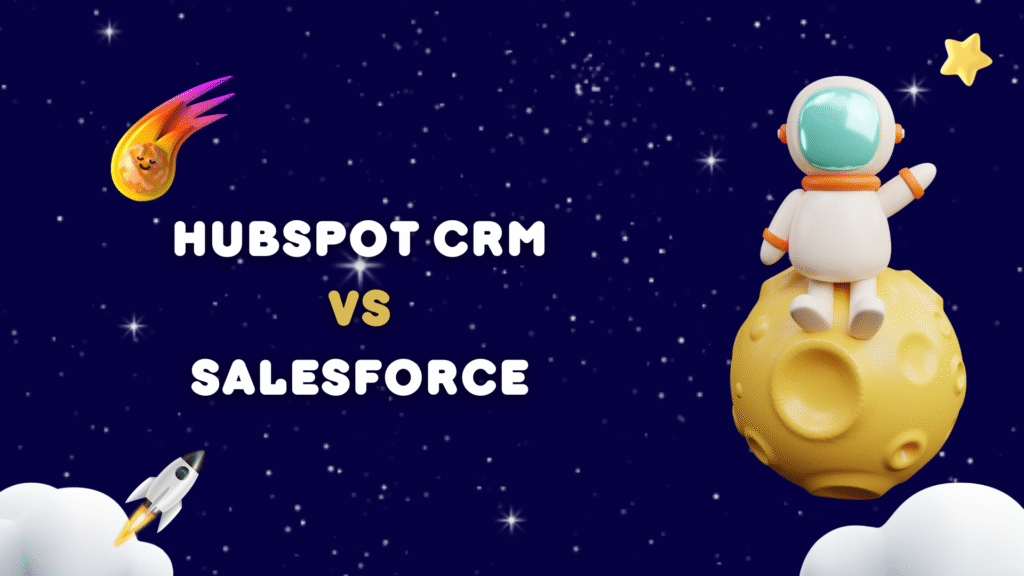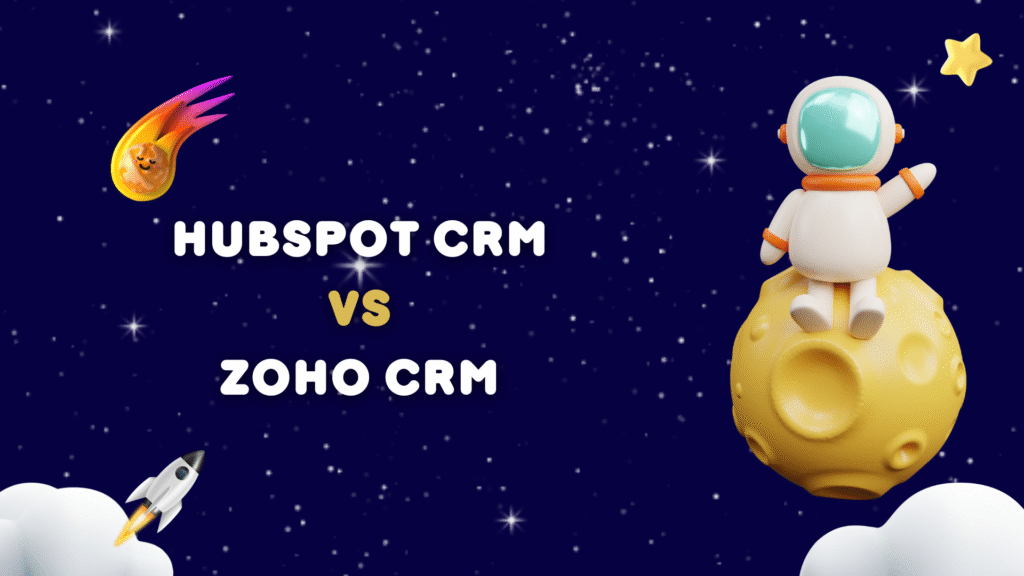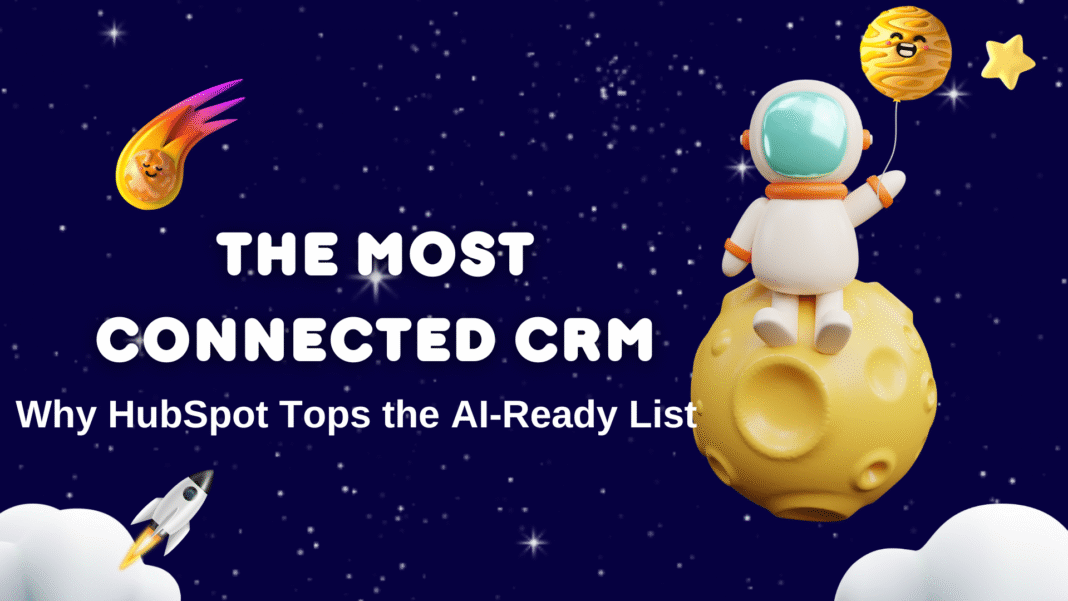HubSpot is the most connected CRM in 2025. The platform offers over 1,800+ native integrations, built-in AI tools like ChatSpot and Content Assistant, and intelligent automation that seamlessly connects your entire business ecosystem without switching between platforms or manual data entry.
When I look at the CRM market now, this connectivity advantage is what sets HubSpot apart from every competitor.
I’ve tested and worked with the most popular CRMs during my years of freelancing, and HubSpot’s combination of integrations, built-in AI tools, and ease of use makes it a solid choice for anyone who values both speed and scalability.
Why Connectivity is Non-Negotiable
The Modern Tech Stack Problem
A connected CRM is non-negotiable because most businesses rely on 10–15 different tools every day — from email to payments to project tracking.
Without strong integrations, you end up in a mess of manual updates, missed follow-ups, and duplicated data.
A connected CRM eliminates that chaos. Instead of jumping between tabs, you get one central hub where every conversation, payment, and project is automatically updated.
How Integration Increases ROI
Integrations directly increase ROI. Every connection saves time, cuts manual work, and adds measurable revenue.
When your CRM can automatically log a Zoom call, generate an AI report, and send the follow-up email without you touching a thing, that’s when you start seeing the real ROI.
HubSpot CRM: The Most Connected, AI-Ready Platform
HubSpot actually delivers on integrations. Unlike many CRMs that overpromise, it makes connections seamless and reliable.
Native Integration Count Comparison Table
| CRM | Native Integrations | AI Tools Built-In | Ease of Use (1–5) |
|---|---|---|---|
| HubSpot | 1,800+ | ChatSpot, Content Assistant | 5 |
| Salesforce | 5,000+ | Einstein, Agentforce | 4 |
| Zoho CRM | 500+ | Zia AI | 3 |
| Pipedrive | 500+ | Third-party AI | 3 |
| ActiveCampaign | 800+ | AI Insights | 4 |
HubSpot’s integrations go beyond surface-level connections. HubSpot integrations go deeper than surface-level connections. With Google Workspace, meetings, emails, and notes flow in automatically — plus AI-suggested actions.
In a recent report, stats show that HubSpot customers acquire 129% more leads, close 36% more deals, and improve ticket closure rates by 37% within one year.
Built-In AI That Works Where You Work
HubSpot’s ChatSpot lets me pull reports, draft outreach emails, or research leads simply by asking in natural language. Its Content Assistant helps me create blog posts, social updates, and email copy without leaving the CRM.
HubSpot AI tools are built-in, not bolted on. They tap into your CRM data instantly and work within your existing workflows.
But there is more… HubSpot isn’t just using its own AI tools like ChatSpot and Content Assistant. It now integrates directly with leading AI assistants such as Claude and ChatGPT.
This means you can ask natural language questions about your sales pipeline, generate email drafts, brainstorm blog outlines, and even analyze customer data right inside HubSpot.
No switching tabs, no copy-pasting, just instant, AI-powered productivity.
PRO TIP: Connect HubSpot with Claude to summarize long email threads instantly — great for prepping before calls.
Flexible for Custom Setups
If you need something more specific, HubSpot’s API and compatibility with iPaaS tools like Make or Zapier let you connect even niche apps without complex development.
Quick Wins with HubSpot + AI
With HubSpot’s AI integrations, you start seeing results almost immediately, in ways that save time, close deals faster, and keep customers happy.
Here are just a few examples:
- Instant lead qualification — AI scans new contacts and prioritizes high-value leads in seconds
- Faster follow-ups — AI drafts personalized emails that sound like you, not a template
- Smarter meeting prep — Claude summarizes long email chains before you join the call
- Consistent customer service — ChatGPT auto-suggests answers based on your knowledge base
- Seamless integrations — AI works inside HubSpot with your existing tools, no copy-pasting needed
HubSpot CRM vs Salesforce

Salesforce dominates in sheer integration volume, offering over 5,000 options on AppExchange. It’s ideal for large enterprises with specialized needs and dedicated admin teams.
Where it shines:
- Extensive customization
- Enterprise-grade AI with Einstein and Agentforce
Where it falls short for smaller teams:
- Steeper learning curve
- Higher cost of ownership
Cost & Setup Comparison
| CRM | Average Setup Time | Requires Dedicated Admin | Starting Cost/Month |
|---|---|---|---|
| HubSpot | 2–3 weeks | No | $0–$50 |
| Salesforce | 1–3 months | Often Yes | $25–$150+ |
HubSpot CRM vs Zoho CRM

Zoho CRM balances affordability with AI. Its Zia assistant and ecosystem integrations make it practical for budget-conscious teams.
It’s a practical choice for smaller businesses prioritizing budget over design polish.
Pricing & AI Access Comparison
| CRM | Free Plan | AI Features in Free Plan | Starting Paid Plan* | AI in Paid Plan |
|---|---|---|---|---|
| HubSpot | ✅ | ✅ | $9/mo | ✅ |
| Zoho CRM | ✅ | ❌ | $9/mo | ✅ |
| Salesforce | ❌ | ✅ | $25/mo | ✅ |
Key Factors in Choosing a Connected CRM
Integration Breadth vs Depth Table
| Factor | HubSpot | Salesforce | Zoho CRM |
|---|---|---|---|
| Breadth of Integrations | High | Very High | Medium |
| Depth of Integration | Very High | High | Medium |
| AI Built-In | Yes | Yes | Yes |
| Best For | SMBs, Startups, Freelancers | Enterprises | Small Businesses |
HubSpot wins on integration depth. Breadth matters, but true productivity comes from how well tools actually sync.
What NOT to Do When Picking a CRM
Buying CRM software based only on price is a costly mistake. Missing integrations, clunky workflows, and weak AI quickly erase any savings.
I’ve seen businesses go for a “bargain” platform, only to hit roadblocks within months: missing integrations, no AI capabilities, and clunky workflows that require extra manual work.
By the time they migrate to a better CRM, they’ve already lost time, frustrated their team, and paid twice for implementation.
Common CRM Shortfalls vs HubSpot Strengths
| Critical Feature | What Happens Without It | HubSpot CRM |
|---|---|---|
| Deep App Integrations | Manual data entry, double work | ✅ 1,800+ native integrations |
| Built-In AI Tools | Slower decision-making, missed leads | ✅ ChatSpot & Content Assistant |
| Payment System Integration | Delayed billing, scattered invoices | ✅ Stripe, PayPal, and more |
| Workflow Automation Templates | Time wasted on repetitive tasks | ✅ Prebuilt + custom workflows |
| Scalable API Access | Limited growth potential | ✅ Open API for custom builds |
Instead of prioritizing price, I recommend evaluating these five capabilities first. If a CRM falls short here, the “savings” disappear fast.
PRO TIP: Don’t paste sensitive client data into public AI tools without checking compliance. Use HubSpot’s built-in AI integrations instead — they’re designed for secure business use.
Frequently Asked Questions About The Most Connected CRM
Q. What makes HubSpot the most connected CRM?
HubSpot is considered the most connected CRM because it has over 1,800+ native integrations with popular tools like Gmail, Slack, Zoom, Shopify, and QuickBooks.
It also offers an open API, letting you connect any custom app or internal system. This means your sales, marketing, customer service, and payment workflows can all run from one platform without switching between apps.
Q. Does HubSpot CRM have AI features?
Yes. HubSpot includes AI-powered tools such as ChatSpot, which allows you to search your CRM, draft emails, and generate reports via natural language, and Content Assistant, which helps you write blog posts, emails, and social media copy faster.
AI in HubSpot is designed to improve lead qualification, personalize customer interactions, and automate repetitive tasks.
Q. Is HubSpot better than Salesforce for small businesses?
For small businesses, HubSpot is often a better fit because it’s easier to set up, requires little to no coding, and has a free plan to start with.
Salesforce is powerful but can be complex and costly to maintain for smaller teams. HubSpot’s drag-and-drop automation builder and built-in integrations make it ideal for teams without dedicated IT resources.
Q. Can HubSpot integrate with payment systems?
Yes. HubSpot connects with major payment processors like Stripe, PayPal, and QuickBooks Payments.
This allows businesses to send invoices, receive payments, and track transactions directly inside their CRM, eliminating the need for separate billing software.
Q. Does HubSpot work with Claude or ChatGPT?
Yes. HubSpot recently launched official integrations with both Claude and ChatGPT, allowing users to chat with AI directly inside their CRM.
This helps with tasks like generating sales emails, summarizing meeting notes, and analyzing customer insights — all without leaving HubSpot.
Q. Is HubSpot CRM free?
Yes. HubSpot offers a free CRM plan that includes contact management, email tracking, meeting scheduling, live chat, and basic reporting.
Paid plans unlock advanced features like marketing automation, AI tools, and custom reporting, making it scalable for growing businesses.
Conclusion
After comparing the top CRMs in the market, I can say with confidence: Salesforce may be great for complex enterprise setups, and Zoho CRM is budget-friendly with decent AI connections.
But HubSpot CRM is the most balanced, connected, and AI-ready platform in 2025.
It’s easy to start, powerful enough to grow with you, and integrates deeply with the tools that actually matter. If your goal is to save time, avoid tech headaches, and get real value from AI — HubSpot is where I’d start every time.
Every week, I see businesses wasting hours switching tools. With HubSpot’s integrations and AI, those hours turn into closed deals.
It’s not just a CRM — it’s your connected command center. So, Stop juggling apps. Start growing smarter. Try HubSpot free today and connect your entire business in one powerful, AI-ready platform.
Affiliate Disclosure: This post contains affiliate links. If you click through and make a purchase, BlogProcess may earn a small commission—at no extra cost to you. We only recommend tools we trust and believe bring genuine value to small businesses and entrepreneurs.




